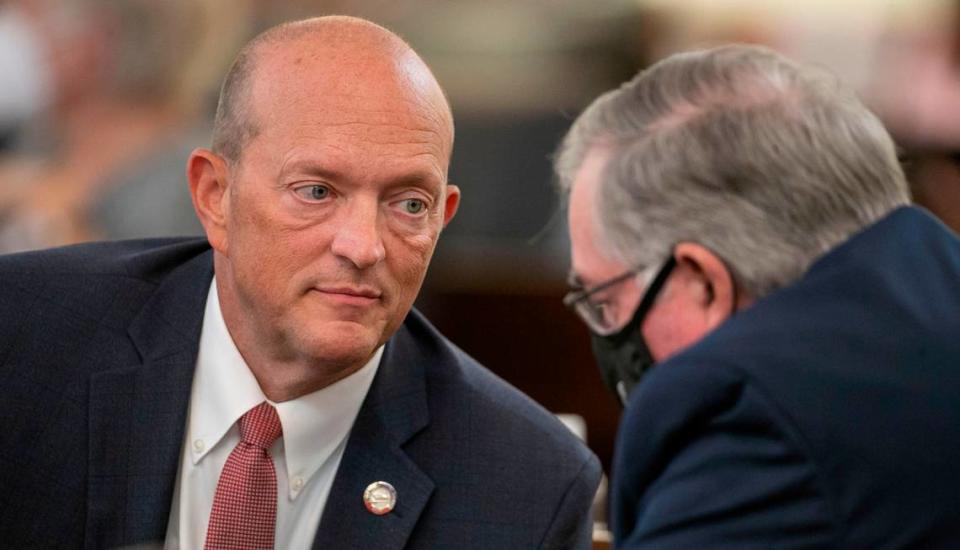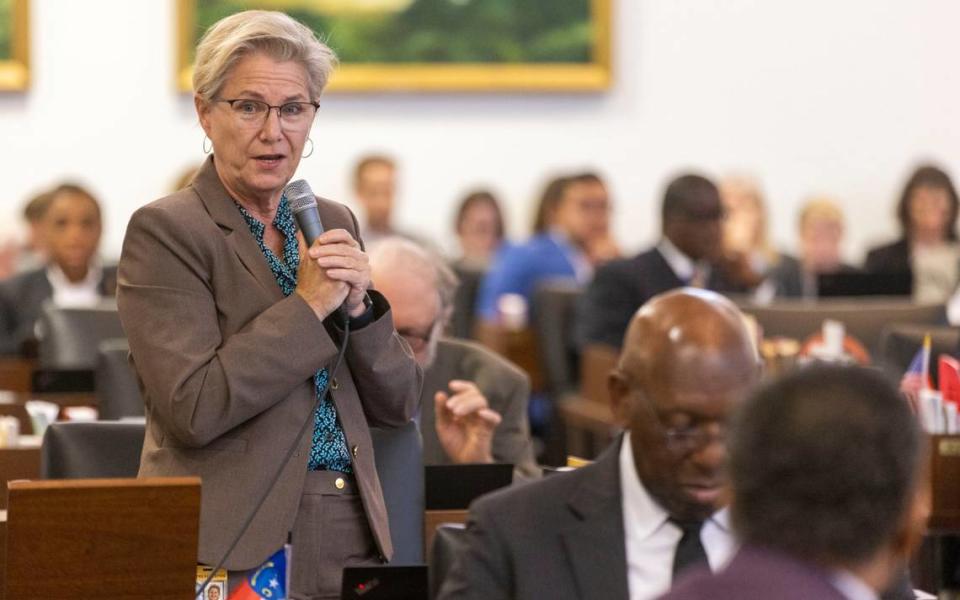NC passes 2022 budget, for Gov. Cooper to sign or veto. Here are the highlights.
- Oops!Something went wrong.Please try again later.
It’s now up to Gov. Roy Cooper to decide whether North Carolina’s proposed state budget, whose billions of dollars in spending include some but not all of what Cooper had wanted, should become law.
The budget gained bipartisan support in votes both Thursday and Friday in the N.C. state House of Representatives and Senate. All Republicans at the GOP-led legislature voted for it, as did about half the Democrats. The session then adjourned, although there is a chance the legislature might come back later in the year, particularly after the November elections.
The highlight of the budget for tens of thousands of North Carolinians are the teacher and state employee raises. Most were already slated to get a 2.5% raise this coming fiscal year, and will now get an additional 1% or 2% raise on top of that if the budget becomes law. Democrats in the legislature, however, had wanted higher raises as well as more spending on issues like broadband internet expansion.
Cooper, a Democrat, hasn’t said if he will sign the budget into law or veto it. But the legislature’s votes — 82-25 in the House and 38-9 in the Senate — are well beyond the supermajority thresholds that would be needed to override a veto.
Senate leader Phil Berger, a Rockingham County Republican, told reporters Friday he wasn’t sure what Cooper would do.
“It looked like a whole lot of folks at the General Assembly are on board with it, and hopefully that resonates with him,” Berger said.
Earlier this week Cooper put out a statement on the budget that largely focused on celebrating separate plans by legislative Republicans to expand Medicaid — a longtime goal of Cooper and other Democrats, but something that Republicans have resisted until this summer. If it does happen, it would extend health care coverage to over half a million North Carolinians, mostly people who work at low-wage jobs without benefits, like in the service and retail industries.
However, even though both the House and Senate passed versions of Medicaid expansion bills in the last few weeks, the competing plans have several big differences and lawmakers didn’t agree on a compromise. The legislative session ends Friday, with North Carolina still one of the few states not to have expanded Medicaid.
“One of the things that we cannot do is leave Raleigh without settling Medicaid,” said House Democratic leader Rep. Robert Reives on Thursday during the budget debate, in a plea to his fellow lawmakers that ultimately was unsuccessful.

Budget preps for economic downturn
Rep. Dean Arp, a Republican budget writer from Union County, compared today’s rising inflation to the Great Recession more than a decade ago and noted the problems that downturn caused in 2009 — the last budget Democrats controlled in North Carolina. He said that this year, Republicans expanded the state’s savings reserve to $5 billion and added another $1 billion into a “stabilization and inflation reserve” in case of a future budget crunch.
“Today, we have put our house in order,” Arp said.

Other Republicans involved in the secretive process — the budget was shown to the public less than 48 hours before the first votes — credited the spending plan for giving state retirees a 4% pension bonus instead of the planned 3% bump, and for spending millions on school safety.
Republican Rep. Jeffrey Elmore, a Wilkes County teacher and legislative budget writer, said there’s $32 million for a special fuel reserve to make sure school buses can keep running even if gas prices go up, plus another $40 million for school safety — ranging from new SROs to grants for security improvements and crisis trainings.
“The locks on the doors, the new fencing, the shadowing out your windows, all that kind of stuff, when I first started you didn’t see a lot of that,” said Elmore, who has been a teacher for over 20 years. “But now you do, because that’s just the state of the world at this point.”
Democratic objections
Sen. Dan Blue, the Senate’s Democratic leader, said several times that the Republican-written budget would pass with largely bipartisan support.
“I have freed up my caucus members to vote however they want to,” he said, “...not trying to force anyone to do anything, not trying to pull rank, and I could have.”
But he had several objections. The legislature should have spent more money on educators and other state employees, he said.
“To have $9 billion and not invest some of it in our greatest resources is a form of sabotage,” Blue said.
In the House, Democratic Rep. Graig Meyer of Orange County referenced the long-running Leandro court case over education funding, in which state judges have ruled for decades the legislature is not spending enough on schools. The latest iteration of the case will be heard in the N.C. Supreme Court in August.
““The biggest challenge facing our schools right now is the teacher shortage,” Meyer said, adding: “Every single school district in the state, no matter where you live, has teacher shortages today for next school year. But the budget falls about $443 million short of what’s recommended” in the Leandro plan.
Some Democrats also criticized controversial items that did make the budget, like a provision that gives local sheriffs more control over the state-mandated investigations that are launched whenever jail inmates die in their custody.
Wilmington Rep. Deb Butler also cited the taxpayer money being sent to pregnancy crisis centers, which are run by anti-abortion groups.

And while other Democrats voted for the budget, many still criticized it as not doing enough.
Fayetteville Rep. Billy Richardson, who isn’t running for re-election, used what might be his final speech Friday to urge his fellow lawmakers to have bigger visions in the future, if they want to truly help the state.
“The only way it’s going to work is if you do bold and brave things,” Richardson said. “That is what we need to do, and that is what we have not done enough of.”
The budget was negotiated secretly this year, with only a small number of top GOP leaders involved in working out the deal that was announced Tuesday evening. Lawmakers then used a special process to stop lawmakers from even attempting to amend the bill once it became public.
Democrats criticized the lack of transparency and collaboration.
“I firmly believe we can get to a place in government where we recognize diversity in opinion is a good thing,” Reives said.
Butler was even more blunt: “We are spending $27.9 billion with this budget today,” she said. “And there are 51 talented Democrats over here, elected by the people of North Carolina, who have been completely cut out of the process.”
For more North Carolina government and politics news, listen to the Under the Dome politics podcast from The News & Observer and the NC Insider. You can find it at https://campsite.bio/underthedome or wherever you get your podcasts.

